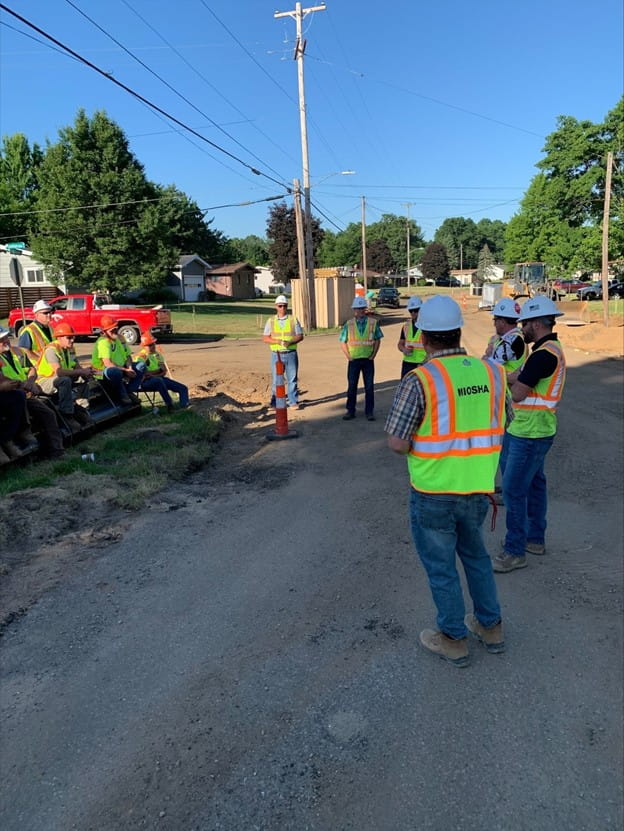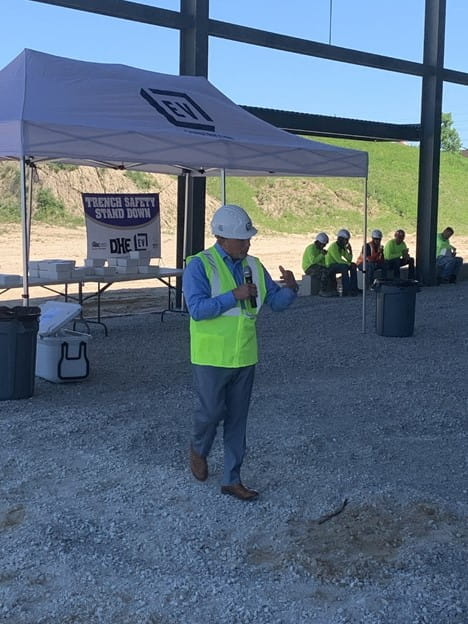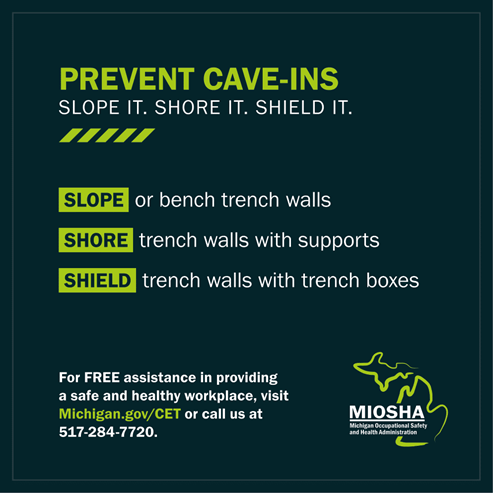The web Browser you are currently using is unsupported, and some features of this site may not work as intended. Please update to a modern browser such as Chrome, Firefox or Edge to experience all features Michigan.gov has to offer.
MIOSHA and West Michigan Employers Stand Down to Raise Awareness of Trenching and Excavation Hazards
June 23, 2022
LANSING, Mich. — The Michigan Occupational Safety and Health Administration (MIOSHA) joined with employers in west Michigan for Trench Safety Stand Down Week to reinforce the critical message of trench safety and help stop unprotected trenches from becoming early graves.
The agency visited with more than 115 employees at sites ranging from company offices, new builds and excavation sites involving the installation of underground utilities to encourage open dialogue and training on trenching hazards.
Excavation and trenching operations are among some of the most hazardous jobs in the construction industry. Just one cubic yard of soil can weigh as much as a car. That’s why MIOSHA is encouraging employers to talk directly with their workers about hazard recognition and how to implement safety measures when working in a trench.
“The key to reducing trenching accidents is training and the use of appropriate protections,” said MIOSHA Director Bart Pickelman. “We urge all construction companies involved in excavation work to take time this month and beyond to talk with their teams about trench safety and take advantage of our free consultative assistance to help protect their employees from cave-ins.”
One of the deadliest hazards associated with excavation and trenching are cave-ins, which cause serious and often fatal injuries to Michigan workers and employees across the nation. Other potential dangers include falling loads, standing water, hazardous atmospheres and mobile equipment.
In April, two Michigan workers were killed in a cave-in accident in Alto while placing underground drainage tiles for a building project. The incident is currently under investigation by MIOSHA.
Despite the many safety hazards underground work poses, it can be performed safely with the aid of proper protections. There are three main ways to protect workers during excavation and trenching work:
- Sloping or benching trench walls
- Shoring trench walls with supports, or
- Shielding trench walls with trench boxes
A trench box is a fundamental piece of equipment when excavating and can be rented, purchased or built. By using a trench box, following the rules contained in MIOSHA's Excavation, Trenching, and Shoring Construction Safety and Health Standard and having qualified, trained employees on the job, employers can avoid cave-ins and other serious incidents.
“Kamminga and Roodvoets greatly values the importance of partnering with MIOSHA in taking part of the trench safety stand down,” said John Schnittker, Kamminga & Roodvoets, Inc. safety and health director. “Educating and equipping our employees with the right tools and knowledge on ways to remain safe during excavation is a top priority for us. We see firsthand the benefit of training, as it is a major factor in reducing workplace injuries. This is a great opportunity for employers and workers to further enhance their knowledge in excavation safety.”
Trench Safety Stand Down Week is an annual initiative spearheaded by the National Utility Contractors Association and supported by both MIOSHA and federal OSHA, which are focused on reducing trenching and excavation hazards. MIOSHA has adopted the national emphasis program on excavation and trenching to help prevent future incidents.
For help with identifying excavation hazards, understanding MIOSHA regulations and more, employers can submit a request for free, confidential, consultative assistance at www.michigan.gov/cet or call 517-284-7720. For more resources on trench safety, visit the MIOSHA website.
###

MIOSHA connecting with industry on a utility replacement project in a Grand Rapids subdivision.

A Elzinga & Volkers representative sharing the emphasis on safety and health at a new
commercial construction project in Holland.

Media Contact: